外研版(2019)必修第一册Unit 2 Exploring English Starting out &Understanding Ideas 课件(共31张PPT)
文档属性
| 名称 | 外研版(2019)必修第一册Unit 2 Exploring English Starting out &Understanding Ideas 课件(共31张PPT) |
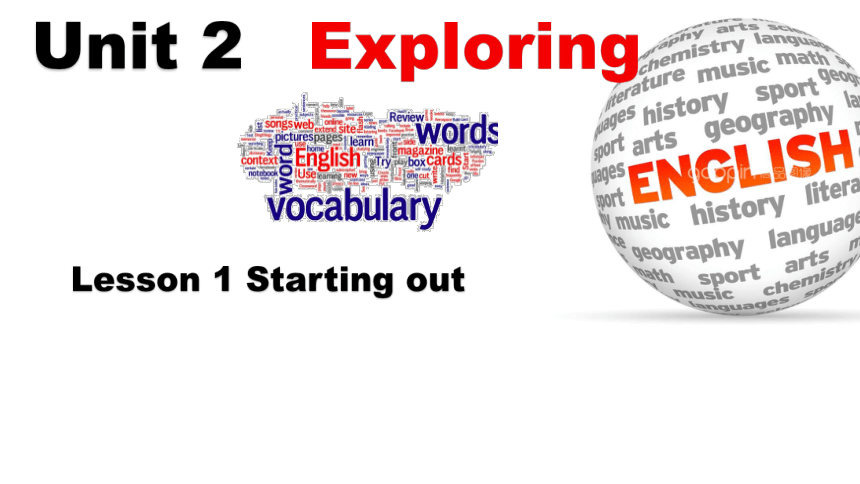
|
|
| 格式 | pptx | ||
| 文件大小 | 33.6MB | ||
| 资源类型 | 教案 | ||
| 版本资源 | 外研版(2019) | ||
| 科目 | 英语 | ||
| 更新时间 | 2023-10-10 00:00:00 | ||
图片预览

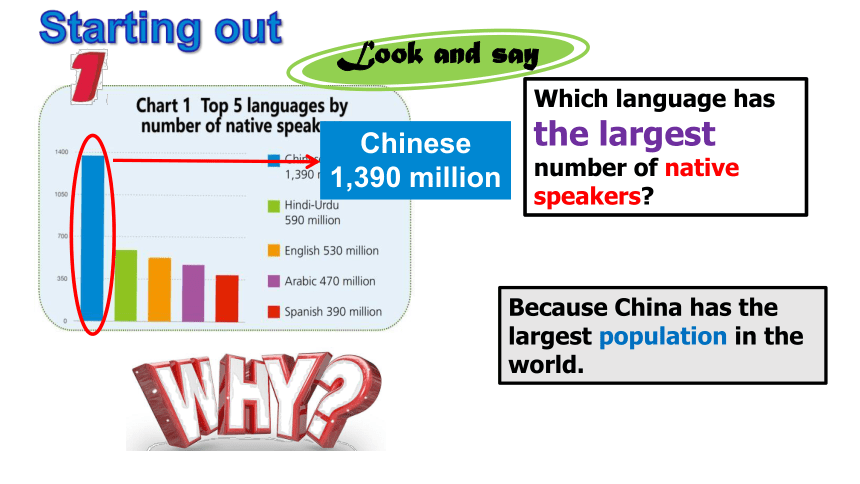
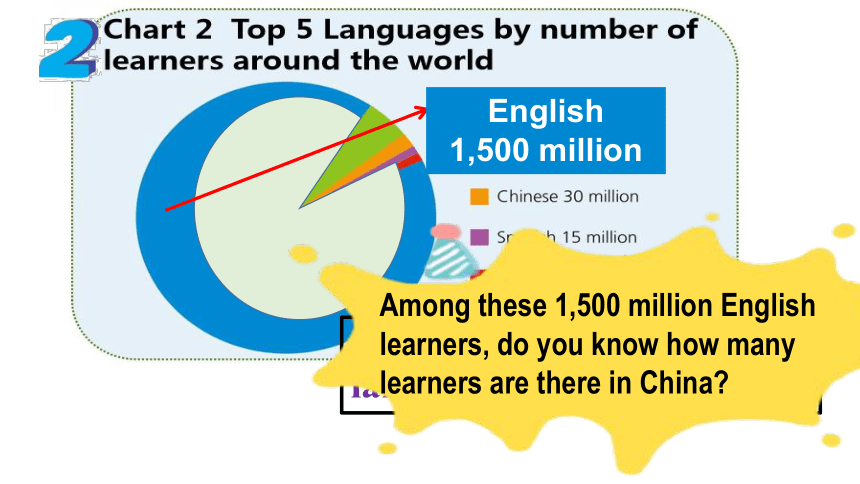
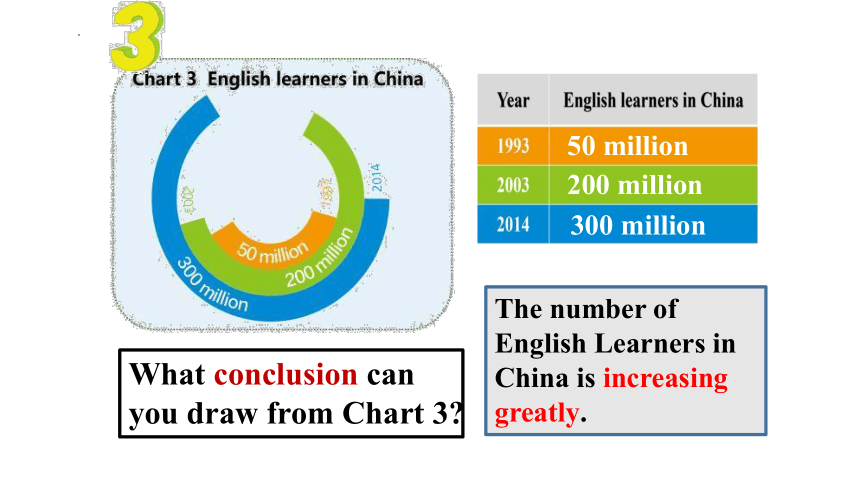
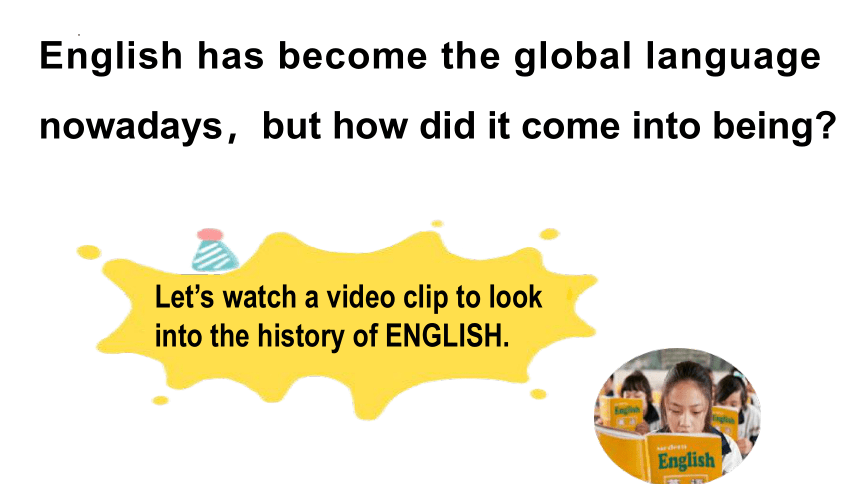
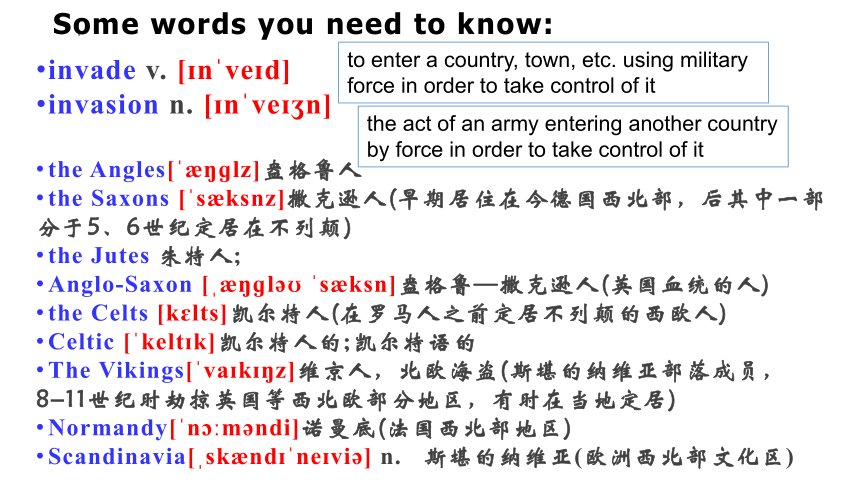

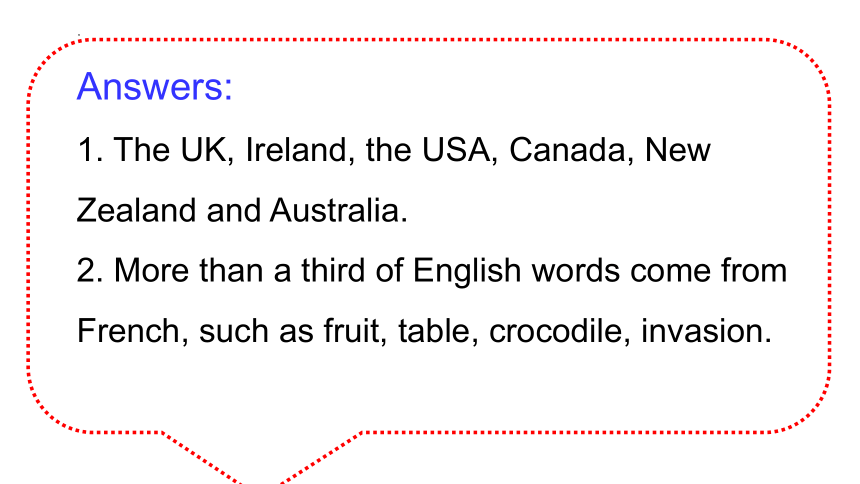
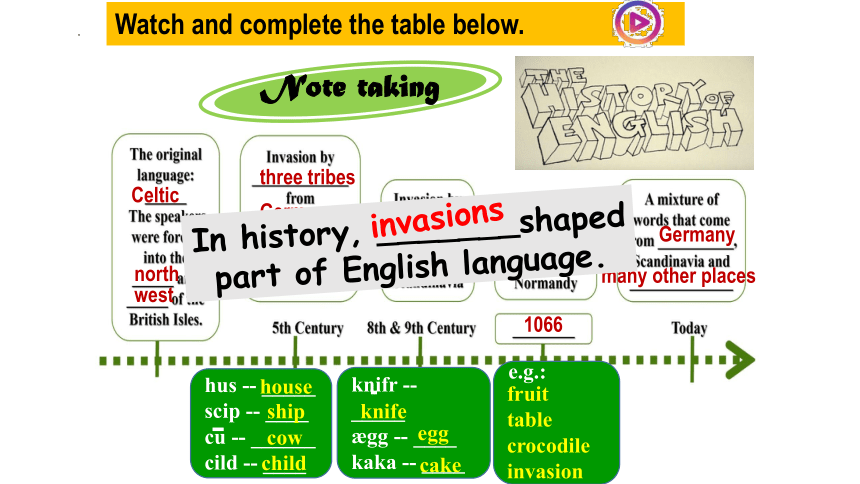
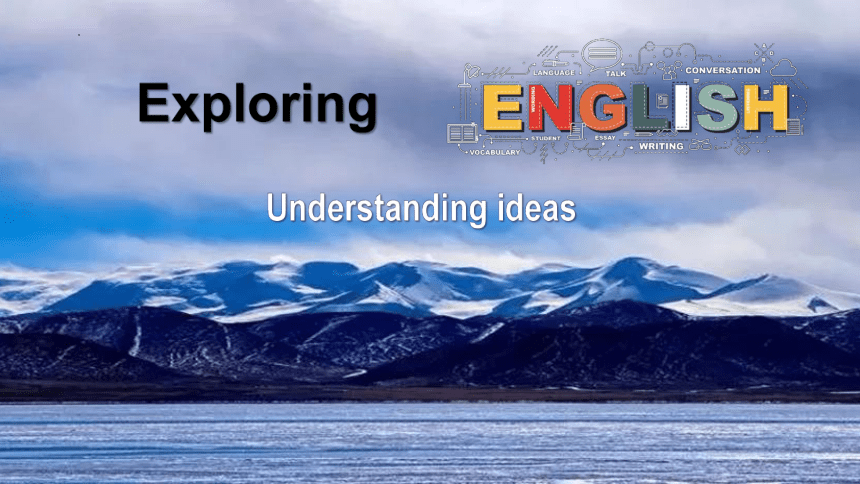
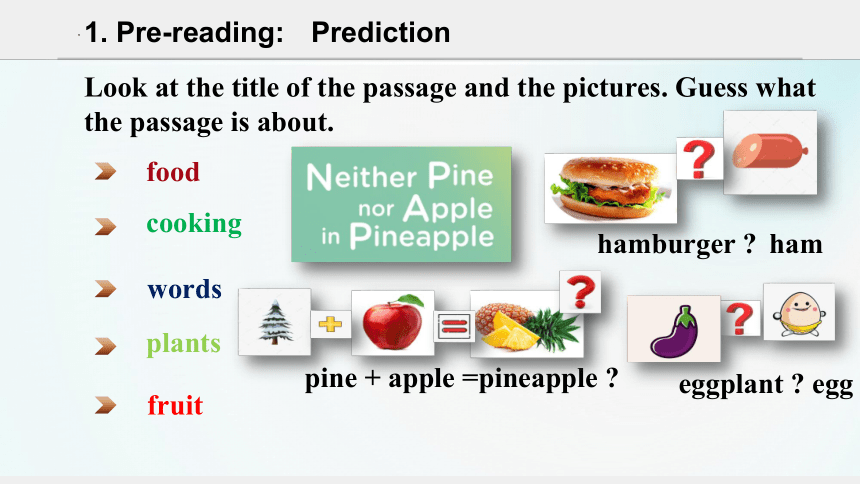

文档简介
(共31张PPT)
Unit 2 Exploring
Lesson 1 Starting out
Which language has the largest number of native speakers
Look and say
Because China has the largest population in the world.
Chinese 1,390 million
Starting out
Which language has the largest number of learners
English
1,500 million
Among these 1,500 million English learners, do you know how many learners are there in China
What conclusion can you draw from Chart 3
50 million
200 million
300 million
The number of English Learners in China is increasing greatly.
English has become the global language nowadays,but how did it come into being
Let’s watch a video clip to look into the history of ENGLISH.
Some words you need to know:
invade v. [ n ve d]
invasion n. [ n ve n]
the Angles[ ɡlz]盎格鲁人
the Saxons [ s ksnz]撒克逊人(早期居住在今德国西北部,后其中一部分于5、6世纪定居在不列颠)
the Jutes 朱特人;
Anglo-Saxon [ ɡl s ksn]盎格鲁—撒克逊人(英国血统的人)
the Celts [k lts]凯尔特人(在罗马人之前定居不列颠的西欧人)
Celtic [ kelt k]凯尔特人的;凯尔特语的
The Vikings[ va k z]维京人,北欧海盗(斯堪的纳维亚部落成员,8–11世纪时劫掠英国等西北欧部分地区,有时在当地定居)
Normandy[ n m ndi]诺曼底(法国西北部地区)
Scandinavia[ sk nd ne vi ] n. 斯堪的纳维亚(欧洲西北部文化区)
to enter a country, town, etc. using military force in order to take control of it
the act of an army entering another country by force in order to take control of it
Watch and say
1. Which countries mentioned in the video have English as their first language
2. Where do a third of English words come from What examples are given in the video
Answers:
1. The UK, Ireland, the USA, Canada, New Zealand and Australia.
2. More than a third of English words come from French, such as fruit, table, crocodile, invasion.
hus -- _____
scip -- ____
cu -- ______
cild -- ____
knifr -- _____
gg -- ____
kaka -- ____
Celtic
north
west
three tribes
Germany
Vikings
1066
French
Germany
many other places
house
ship
cow
child
knife
egg
cake
Note taking
Watch and complete the table below.
e.g.:
fruit
table
crocodile
invasion
In history, _______shaped part of English language.
invasions
Exploring
Understanding ideas
1. Pre-reading: Prediction
Look at the title of the passage and the pictures. Guess what the passage is about.
food
cooking
plants
fruit
words
pine + apple =pineapple
hamburger ham
eggplant egg
1. What is the author’s purpose in writing the passage
A. To tell us that English is difficult to learn.
B. To give advice on how to learn English.
C. To show that English is interesting and creative.
D. To explain how English was created.
2. Fast reading: Skim for main idea
Read the passage quickly and answer the questions.
Why do you think so Can you find examples in the passage
interesting
creative
Fast reading: Reading strategy
How to get the main idea of a passage quickly
Analyze the title and the pictures carefully and predict.
Read for the topic sentence, which is usually in the first or last paragraph.
Read the first sentence of each paragraph.
Pay attention to the structure of the passage.
Introduce the topic
List some examples
Draw a conclusion
The author's opinion
Learn to understand the structure.
Topic
The author explains his / her opinion ( English is interesting and creative.) by giving a lot of examples.
Intensive reading: Find detailed information
3. Read the passage carefully and complete the notes with words from the passage.
In order to support his idea, the author uses many examples that show the 1.__________ madness of English.
no egg in eggplant no ham in 2.__________ neither pine nor apple in 3. ____________ sculpt a sculpture
paint a(n) 4.______________
BUT take a photo
Intensive reading: Find detailed information
unique
hamburger
pineapple
painting
We can’t always understand a compound word by adding the meanings of the words it is made up of!
Intensive reading: Find detailed information
In order to support his idea, the author uses many examples that show the unique madness of English.
seasick → sick at sea 5.___________ → sick in the air 6.___________ → sick in a car BUT 7. __________ → sick at home “Hard” is the opposite of “soft”.
“hardly “ and “softly” are not a(n) 8.___________ pair.
airsick
carsick
homesick
opposing
The same rule doesn’t always apply to everything!
Intensive reading: Find detailed information
In order to support his idea, the author uses many examples that show the unique madness of English.
“Harmless” is the opposite of “harmful”. Shameful and shameless 9.__________ are the same. burn up → burn down
fill in a form → 10. _______a form
behaviors
fill out
Seemingly opposite words or phrases may have the same meaning!
Intensive reading: Find detailed information
In order to support his idea, the author uses many examples that show the unique madness of English.
Stars are out . → They are visible. Lights are out. → They are 11.__________. I wind up my watch. →It starts.
I wind up the passage. →
It 12.________.
The reason is that English was invented by people, and it 13.___________the creativity of the human race.
invisible
ends
reflects
The same words and phrases may have different meanings in different contexts.
While we are doing all this travelling, we can get seasick at sea, airsick in the air and carsick in a car, but we don’t get homesick when we get back home.
“When we look out of the window and see rain or snow, we can say “it’s raining” or “it’s snowing”. But when we see sunshine, we can’t say “it’s sunshining”.”
4. Imitate and create :
Can you find a sentence of the same/ similar pattern
The author give examples by _________________.
For example, we ..., but we ...
When we..., we can. But when we..., we can’t....
If..., why (not)...
Imitate and create
The author explains his / her opinion ( English is interesting and creative.) by_______________________
comparing
The author explains his / her opinion ( English is interesting and creative.) by_______________________
reasoning
We go to work by bus and take a trip by car, but we get back home on foot.
If “hard” is the opposite of “soft”, why are “hardly” and “softly” not an opposing pair
2. If harmless actions are the opposite of harmful actions, why are shameless and shameful behaviors the same
4. Imitate and create (2):
If “inactive” means “not active” and “incomplete” means “not complete”, why does “invaluable” mean “very valuable”/ why doesn’t “invaluable” mean “not valuable”
by bus/by car/on foot
inactive/incomplete/invaluable
luckily/quickly/slowly/likely (adj.)
(your examples)
but
if…why…
(not)
I think English is a crazy language. For
example, …
If schoolwork is the work we do at school,
then homework is the work we do at ______.
If applesauce is made from apple,
then cheesecake is made from _______.
cheese
“If…then...” Circle
5. Reasoning Game
home
If there are sticks in chopsticks,
then there is ______ in eggshell.
If we can find tea in teapot,
then can we find ______ in pineapple.
pine
shell
6. Further reading: The origin of some words
1. The word “pineapple” developed from the Spanish word “pina”, which means pine cone. When it came to England, “apple” was added to show it is a kind of fruit.
2. The origin of “hamburger” was a hard beef steak called “Hamburg steak”, eaten without bread. Later, people reinvented it and called it “hamburger”.
3. Eggplants used to be smaller and yellow or white. They looked a bit like eggs, which led to the name “eggplant”.
Read the following information.
pine cone
pineapple
Hamburg steak
hamburger
eggplant
There is a reason!!!
There is a reason for everything. Though it is a mystery to me now, I know it won’t always be so.
by Ben Sherwood
In the future, when we read seemingly “crazy” English, what can we do
Unit 2 Exploring
Lesson 1 Starting out
Which language has the largest number of native speakers
Look and say
Because China has the largest population in the world.
Chinese 1,390 million
Starting out
Which language has the largest number of learners
English
1,500 million
Among these 1,500 million English learners, do you know how many learners are there in China
What conclusion can you draw from Chart 3
50 million
200 million
300 million
The number of English Learners in China is increasing greatly.
English has become the global language nowadays,but how did it come into being
Let’s watch a video clip to look into the history of ENGLISH.
Some words you need to know:
invade v. [ n ve d]
invasion n. [ n ve n]
the Angles[ ɡlz]盎格鲁人
the Saxons [ s ksnz]撒克逊人(早期居住在今德国西北部,后其中一部分于5、6世纪定居在不列颠)
the Jutes 朱特人;
Anglo-Saxon [ ɡl s ksn]盎格鲁—撒克逊人(英国血统的人)
the Celts [k lts]凯尔特人(在罗马人之前定居不列颠的西欧人)
Celtic [ kelt k]凯尔特人的;凯尔特语的
The Vikings[ va k z]维京人,北欧海盗(斯堪的纳维亚部落成员,8–11世纪时劫掠英国等西北欧部分地区,有时在当地定居)
Normandy[ n m ndi]诺曼底(法国西北部地区)
Scandinavia[ sk nd ne vi ] n. 斯堪的纳维亚(欧洲西北部文化区)
to enter a country, town, etc. using military force in order to take control of it
the act of an army entering another country by force in order to take control of it
Watch and say
1. Which countries mentioned in the video have English as their first language
2. Where do a third of English words come from What examples are given in the video
Answers:
1. The UK, Ireland, the USA, Canada, New Zealand and Australia.
2. More than a third of English words come from French, such as fruit, table, crocodile, invasion.
hus -- _____
scip -- ____
cu -- ______
cild -- ____
knifr -- _____
gg -- ____
kaka -- ____
Celtic
north
west
three tribes
Germany
Vikings
1066
French
Germany
many other places
house
ship
cow
child
knife
egg
cake
Note taking
Watch and complete the table below.
e.g.:
fruit
table
crocodile
invasion
In history, _______shaped part of English language.
invasions
Exploring
Understanding ideas
1. Pre-reading: Prediction
Look at the title of the passage and the pictures. Guess what the passage is about.
food
cooking
plants
fruit
words
pine + apple =pineapple
hamburger ham
eggplant egg
1. What is the author’s purpose in writing the passage
A. To tell us that English is difficult to learn.
B. To give advice on how to learn English.
C. To show that English is interesting and creative.
D. To explain how English was created.
2. Fast reading: Skim for main idea
Read the passage quickly and answer the questions.
Why do you think so Can you find examples in the passage
interesting
creative
Fast reading: Reading strategy
How to get the main idea of a passage quickly
Analyze the title and the pictures carefully and predict.
Read for the topic sentence, which is usually in the first or last paragraph.
Read the first sentence of each paragraph.
Pay attention to the structure of the passage.
Introduce the topic
List some examples
Draw a conclusion
The author's opinion
Learn to understand the structure.
Topic
The author explains his / her opinion ( English is interesting and creative.) by giving a lot of examples.
Intensive reading: Find detailed information
3. Read the passage carefully and complete the notes with words from the passage.
In order to support his idea, the author uses many examples that show the 1.__________ madness of English.
no egg in eggplant no ham in 2.__________ neither pine nor apple in 3. ____________ sculpt a sculpture
paint a(n) 4.______________
BUT take a photo
Intensive reading: Find detailed information
unique
hamburger
pineapple
painting
We can’t always understand a compound word by adding the meanings of the words it is made up of!
Intensive reading: Find detailed information
In order to support his idea, the author uses many examples that show the unique madness of English.
seasick → sick at sea 5.___________ → sick in the air 6.___________ → sick in a car BUT 7. __________ → sick at home “Hard” is the opposite of “soft”.
“hardly “ and “softly” are not a(n) 8.___________ pair.
airsick
carsick
homesick
opposing
The same rule doesn’t always apply to everything!
Intensive reading: Find detailed information
In order to support his idea, the author uses many examples that show the unique madness of English.
“Harmless” is the opposite of “harmful”. Shameful and shameless 9.__________ are the same. burn up → burn down
fill in a form → 10. _______a form
behaviors
fill out
Seemingly opposite words or phrases may have the same meaning!
Intensive reading: Find detailed information
In order to support his idea, the author uses many examples that show the unique madness of English.
Stars are out . → They are visible. Lights are out. → They are 11.__________. I wind up my watch. →It starts.
I wind up the passage. →
It 12.________.
The reason is that English was invented by people, and it 13.___________the creativity of the human race.
invisible
ends
reflects
The same words and phrases may have different meanings in different contexts.
While we are doing all this travelling, we can get seasick at sea, airsick in the air and carsick in a car, but we don’t get homesick when we get back home.
“When we look out of the window and see rain or snow, we can say “it’s raining” or “it’s snowing”. But when we see sunshine, we can’t say “it’s sunshining”.”
4. Imitate and create :
Can you find a sentence of the same/ similar pattern
The author give examples by _________________.
For example, we ..., but we ...
When we..., we can. But when we..., we can’t....
If..., why (not)...
Imitate and create
The author explains his / her opinion ( English is interesting and creative.) by_______________________
comparing
The author explains his / her opinion ( English is interesting and creative.) by_______________________
reasoning
We go to work by bus and take a trip by car, but we get back home on foot.
If “hard” is the opposite of “soft”, why are “hardly” and “softly” not an opposing pair
2. If harmless actions are the opposite of harmful actions, why are shameless and shameful behaviors the same
4. Imitate and create (2):
If “inactive” means “not active” and “incomplete” means “not complete”, why does “invaluable” mean “very valuable”/ why doesn’t “invaluable” mean “not valuable”
by bus/by car/on foot
inactive/incomplete/invaluable
luckily/quickly/slowly/likely (adj.)
(your examples)
but
if…why…
(not)
I think English is a crazy language. For
example, …
If schoolwork is the work we do at school,
then homework is the work we do at ______.
If applesauce is made from apple,
then cheesecake is made from _______.
cheese
“If…then...” Circle
5. Reasoning Game
home
If there are sticks in chopsticks,
then there is ______ in eggshell.
If we can find tea in teapot,
then can we find ______ in pineapple.
pine
shell
6. Further reading: The origin of some words
1. The word “pineapple” developed from the Spanish word “pina”, which means pine cone. When it came to England, “apple” was added to show it is a kind of fruit.
2. The origin of “hamburger” was a hard beef steak called “Hamburg steak”, eaten without bread. Later, people reinvented it and called it “hamburger”.
3. Eggplants used to be smaller and yellow or white. They looked a bit like eggs, which led to the name “eggplant”.
Read the following information.
pine cone
pineapple
Hamburg steak
hamburger
eggplant
There is a reason!!!
There is a reason for everything. Though it is a mystery to me now, I know it won’t always be so.
by Ben Sherwood
In the future, when we read seemingly “crazy” English, what can we do
